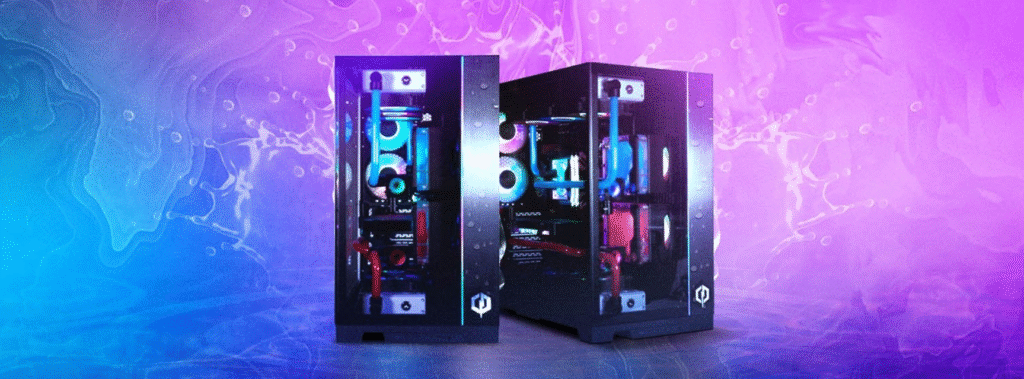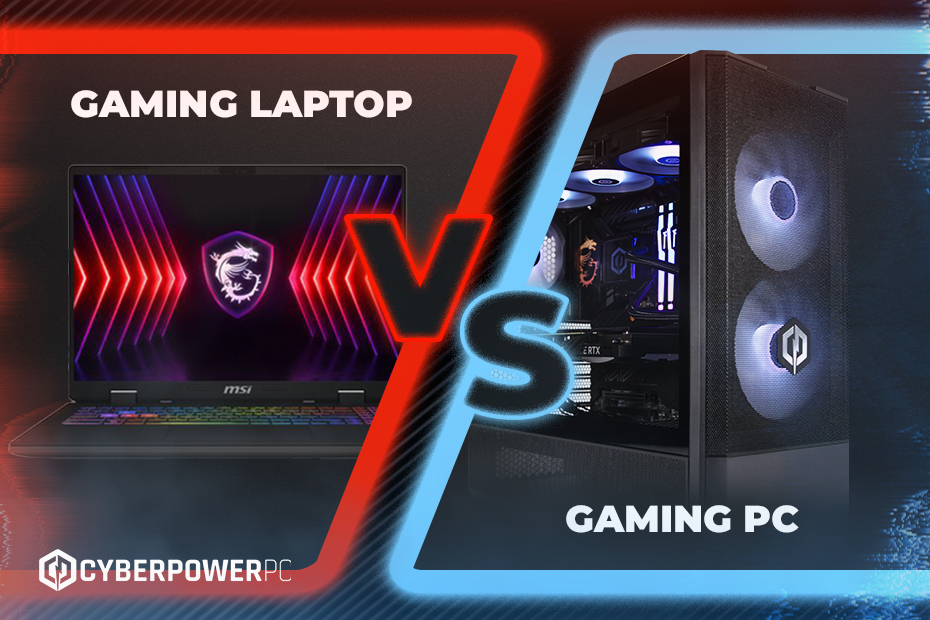If you’re contemplating your next gaming setup, you’re likely weighing up the pros and cons of a gaming laptop versus a desktop gaming PC. Both options can deliver incredible gaming performance, but the experience, cost, portability, and upgrade potential vary dramatically. So, when it comes to choosing between a custom gaming PC or a portable powerhouse, which one is right for you in 2025? Let’s explore the key differences and help you make the best decision for your playstyle and budget..
Performance
When it comes to raw gaming performance, desktop PCs still have the edge. This is mostly due to size and heat dispersion. While manufacturers have made huge strides in mobile GPU and CPU design, laptops remain limited by their compact form factor.
Budget Gaming PC: The Basics
How Laptops and Desktops handle heat
Every calculation your CPU or GPU performs generates heat. In intense gaming sessions, this can cause a serious buildup. Desktop PCs typically include larger heatsinks, better airflow, and more efficient cooling systems — including liquid cooling like our Hyper Liquid Series.
Laptops, on the other hand, must cram all components into a slim shell. Even with advanced cooling tech, they tend to throttle performance more quickly under pressure.
Pro Tip: Want to see how your rig handles heat? Tools like Core Temp can show live temperature data.
Why Desktop Components Run Faster
Even when a laptop boasts the same graphics card model as a desktop, the performance often falls short. That’s because mobile versions are clocked lower to avoid overheating. If you’re after the highest possible frame rates and fastest load times, a custom gaming PC is the clear winner.
Explore real-world GPU benchmarks from KitGuru or check out YouTube reviews to compare side-by-side tests.
Allow your Gaming PC to deal with heat the right way

Choose a liquid cooling system that goes above and beyond with the immersive custom-loop Hyper Liquid Series. Discover more today
Price vs Performance: Which Is Better Value?
If you’re working to a budget, desktops almost always offer better performance for the money. You can spend less on a budget gaming PC and still outperform a similarly priced laptop.
What About Long-Term Cost?
Upgradability plays a big role here (more on that below). A desktop lets you incrementally improve performance over time, while a laptop’s fixed hardware means you’re likely to replace the whole unit when it no longer meets your needs.
Peripherals and User experience
Computers are more than just number-crunchers – they also need to be able to interact with the real world. A gaming session can be made or broken by the input device you’re using; when your mouse stops tracking properly, your experience will suffer. Similarly, output devices – like your monitor or speakers – are what allow us to actually see and hear the action – and they need to be good enough to handle the job.
Keyboards
While LED keyboards that offer the full RGB spectrum can be easily crammed into a laptop, we should also consider the tactile qualities of the device. After all, you’ll spend more time touching those keys than looking at them. A mechanical keyboard designed for gaming will typically come with a throw of several millimetres – which is near-impossible on a laptop. And so, you’ll often experience an inferior ‘feel’ with those devices.
Mice
In most cases, gamers will be using an external mouse. Certain genres, like turn-based 4X games, might allow you to get away with the trackpad – others, like first-person shooters, will not.
Monitors
The key aspects that distinguish monitors from one another are the resolution, refresh rate, and size. In the case of the laptop, the size of your display will be limited by the size of your machine, with anything above 17 inches being out of the question. Again, you can always plug a laptop into an external monitor – but doing so imposes an additional cost.
Sound
Once upon a time, a sound card was a major consideration for those building a new gaming machine. Nowadays, however, every decent motherboard comes with high-quality headphone and speaker outputs, and only audiophiles will need to (or want to) invest in separate interfaces. The upshot of this is that, in terms of sound, there’s very little to separate gaming laptops from desktops.
Upgrades and Customisation
A major point in favour of desktop machines is the ease with which components can be swapped in and out. This means you might use the same case and power supply across multiple builds, swapping out graphics cards and storage drives as the need arises.
While it’s possible to replace components in a laptop, it’s rarely practical, for several reasons:
- The selection of components is limited
- Getting inside the laptop can be incredibly fiddly
- The results can be difficult to predict
In the case of desktop machines, the opposite is generally true: upgrades can be made in mere moments, and a whole slew of specialised components are available, such as oil-based coolers and eye-catching RGB lighting systems.
What can be customised?
The exceptions here are RAM and storage drives, the latter being increasingly available in the ultra-compact M.2 form-factor. If you want to upgrade your CPU, you’re almost always better off swapping the whole machine.
What about overclocking your Gaming PC and Laptop?
Another consequence of the heat being generated is that overclockers don’t have much headroom to explore. This isn’t just a question of aftermarket cooling – laptops are engineered to tighter tolerances, which means (as we’ve mentioned) they run hotter, so cranking that multiplier is more likely to cause trouble.
Portability
One of the biggest advantages of a gaming laptop is portability. You can easily take it to a friend’s house for a multiplayer session or bring it with you while travelling. This flexibility makes it great for social gaming, especially when compared to a fixed gaming PC setup. Whether you’re connecting to a hotel TV for some downtime or gaming in different rooms at home, a gaming laptop offers freedom that a custom gaming PC just can’t. Want to jump into your favourite PC games anywhere? A laptop makes that simple — just plug in and play.
Which is better – gaming PC vs laptop?
Ultimately, the best choice comes down to how and where you game. If you’re aiming for top-tier gaming performance, maximum power, and the freedom to make PC upgrades over time, then a desktop gaming PC – especially a custom gaming PC – is the clear winner. With superior specs and more room to personalise, it delivers the ultimate experience.
On the other hand, if portability and convenience are your priorities, a gaming laptop lets you play wherever you are, from LAN parties to sofa gaming sessions at a friend’s house.
Whichever route you choose – a high-spec gaming laptop or a fully built custom gaming PC – make sure it matches your playstyle. The key is finding the setup that lets you enjoy your favourite games without compromise.
Whatever your decision, your Gaming PC experience starts here.
Discover our high-performance Gaming PCs and Gaming Laptops right here
If you need something a bit more customised, configure yours today!
